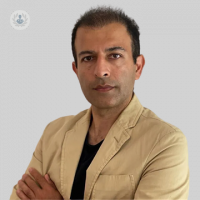Ask an expert: How is advanced ovarian cancer treated?
Written by:In this detailed guide to ovarian cancer, highly respected consultant gynaecological oncology surgeon Mr Hooman Soleymani Majd offers expert insight on the associated symptoms and explains why presentation and diagnosis is often delayed. The leading specialist also sheds light on the most common approaches to treatment of advanced ovarian cancer and reveals how this areas of medicine has evolved in recent years.

What are the symptoms of ovarian cancer?
Ovarian cancer normally presents in a very vague manner. Unfortunately, four out of five women with ovarian cancer present quite late because the symptoms are very variable. The symptoms of ovarian cancer can include early satiety (low appetite), alterations to bowel habits or some urinary symptoms, weight loss and night sweats, amongst others. Often, these patients get labelled with other benign conditions like irritable bowel syndrome.
Even though people say ovarian cancer is a silent killer, I do believe ovarian cancer whispers. We know ovarian cancer patients present quite late but I still believe that its symptoms could be taken into consideration seriously and if you pay attention as a clinician, you might suspect this earlier. Having said that, most patients still present quite late, and unfortunately, by the time four out of five patients with ovarian cancer have presented, their disease is in a late stage.
How is ovarian cancer diagnosed?
Ovarian cancer is diagnosed by different imaging modalities. The most common imaging tool is ultrasound scanning and a blood test, which is called a tumour marker. In ovarian cancer specifically, this blood test is called CA125.
In the primary setting, we perform an ultrasound scan and a CA125 and then we calculate what we call a risk of malignancy index. If that is deemed to be high, then we will organise a CT scan of the patient's chest, abdomen and pelvis, which is a more sophisticated imaging modality. This will tell us more about the nitty gritty of what is happening.
How aggressive is ovarian cancer?
Ovarian cancer is normally aggressive because it's diagnosed quite late, but earlier stage ovarian cancer can be effectively treated with a combination of surgery and chemotherapy. Having said that, all patients are different and each person’s tumour biology and response to chemotherapy and surgery will vary. However, the main thing is to be able to make a diagnosis at the earliest stage possible.
Is advanced ovarian cancer curable? How is it most often treated?
Advanced ovarian cancer is still treatable. The intention of treatment might differ from patient to patient, and in some cases could become palliative. Any ovarian cancer in an advanced stage will be treated with a more radical operation known as ultra-radical debulking, where a surgeon with a special interest in gynaecological oncology will aim to achieve what we call no residual disease, also known as R0, followed by chemotherapy.
If the cancer is very advanced, patients might also get chemotherapy before surgery, which is known as neoadjuvant chemotherapy. Patients who are chosen to be on this pathway will then undergo integral debulking surgery (IDS), followed by more chemotherapy.
The single independent risk factor for survival in ovarian cancer is leaving no cancer cells behind, but being more specific, application of the right form of chemotherapy and management in a multidisciplinary environment would improve the outcome.
How has treatment for ovarian cancer developed in recent years?
Treatment for ovarian cancer has evolved in the last two decades. One reason for this is that treatment is now undertaken in dedicated cancer centres led by gynaecological oncology surgeons who are specially trained to perform ultra-radical surgery for ovarian cancer.
Innovative science in the new era of chemotherapy is also responsible for the advances we have made in the treatment of ovarian cancer. Patients are now treated with more sophisticated chemotherapy regimens and protocol. On the other side, there are many colleagues who are clinician scientists working in the lab, trying to understand more about tumour biology in order to provide patients with more integrated treatment customised to their individual case.
If you wish to schedule a consultation with Mr Soleymani Majd, you can do so by visiting his Top Doctors profile.


